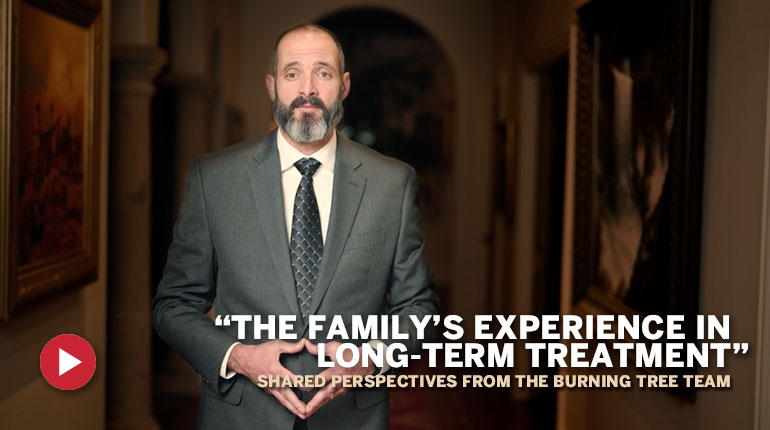The Family’s Experience at Burning Tree Ranch as Shared by Program Leadership & Treatment Team
Video Summary:
This video features insights from several staff members at Burning Tree Ranch, including Meghan Bohlman (Clinical Director), Jesse Earwood (Executive Director), Dawn Wilson (Director of Transition Services), and Brook McKenzie (Chief Operating Officer).
Each of them shares their perspective on the transformative journey of clients from admission to graduation at Burning Tree Ranch, our long-term addiction treatment facility. They highlight the significant changes observed in clients and families, and how graduates establish and maintain a self-supporting life in recovery.
It’s evident that the Burning Tree Ranch program is a transformative journey for both clients and their families. The speakers describe how graduations serve as emotional, hopeful experiences for graduates and as motivation for new clients.
Brook McKenzie, himself a graduate of the program, concludes by emphasizing the joy, accomplishment, and hope experienced by both clients and families at graduation, describing it as an irreplaceable gift after years of struggle with addiction.
Read: Video Transcript
[Video opens with Meghan Bohlman, LPC, LCDC, & Clinical Director of Burning Tree Ranch]
The biggest change that I see at Burning Tree clients from day one to graduation is their drive for life. We get to see them really be excited about life. They’re excited about working with people, they have friends, they have jobs. They manage their own money. They’re fully self-supporting in their own apartment that they signed for.
[Scene changes to Jesse Earwood, Executive Director]
They begin to move towards supporting themselves financially, and begin to be able to take responsibility for what they’re doing in their life day to day. They just become responsible, productive members of society.
[Re-enter Meghan Bohlman]
They have this entire life that they’ve created solely on their efforts; on their back. It’s not because somebody else gave it to them. And I think they feel accomplished, and proud, and really joy that this is where they are in life. So it’s really a springboard for the rest of their life moving forward.
[Scene changes to Dawn Wilson, Director of Transition Services]
Families notice a difference. They can tell when their loved ones started to be honest with them and tell them the truth. One of the things that surprises them is when their loved one apologizes and owns their mistakes with them.
[Scene changes to Brook McKenzie, LCDC, Chief Operating Officer]
My favorite part of seeing a client progress through the entire program at Burning Tree Ranch is to get to participate and witness the actual changes that take place, not only in their personal life but in the lives of their family. To get to see a family smile and to welcome their loved one back into their life in a new way, with new levels of trust, with new levels of hope – it’s an absolutely amazing thing to witness and there’s nothing else that I’d wish to participate in.
[Re-enter Dawn Wilson]
A graduation is there for the families. It’s also there for the clients that are just getting to the ranch. They are getting to have an opportunity to watch somebody who’s gotten their life back. I think a lot of times, clients will sit in the back and be like, “You know, whatever – I’m never going to be able to do this,” and then they see somebody that maybe has a similar story to theirs, and they’ve completed the program. It shows them that it’s possible.
[Re-enter Meghan Bohlman]
You will hear how families talk about how they never thought this would be the day, and they sat in the family workshop in the first thirty days and thought about, “Am I going to get to be the alumni parent that’s speaking at the workshop? Am I going to get to stand up there with my son or daughter, or my husband and wife, and talk to these incoming families and share my experience, strength, and hope?” So I see families really hopeful that they are making it to a day that I don’t think they thought could have happened. I see them, you know, incredibly grateful for the experience and the opportunity that they’ve had, and I see them really wanting to share that.
[Re-enter Jesse Earwood]
I’ve witnessed a lot of very strong feelings and emotions at graduations. We have families who really didn’t think that they were ever going to see their loved one get well. And when they see that happen, they’re mesmerized a little bit, sometimes wonder, “Is this too good to be true?” But they’re extremely grateful for the hope that they have that their family can once again be close, or maybe be closer than they ever had been before.
[Re-enter Brook McKenzie]
I’m so grateful to get to know from my own experience being a Ranch graduate myself that the client gets to experience joy and happiness and the sense of accomplishment in their own graduation, and so does the family. Sometimes for these families, this is the best day of their life and one that they never thought possible. Families express a tremendous amount of joy, a tremendous amount of happiness, and they express in their eyes and in their being a sense of hope. These are families that have been through so much, and for such a long period of time, for them to be able to witness their loved one having two, three, and multiple years sober – it’s a true blessing, it’s a gift, and there’s nothing in the world that could ever replace it.





